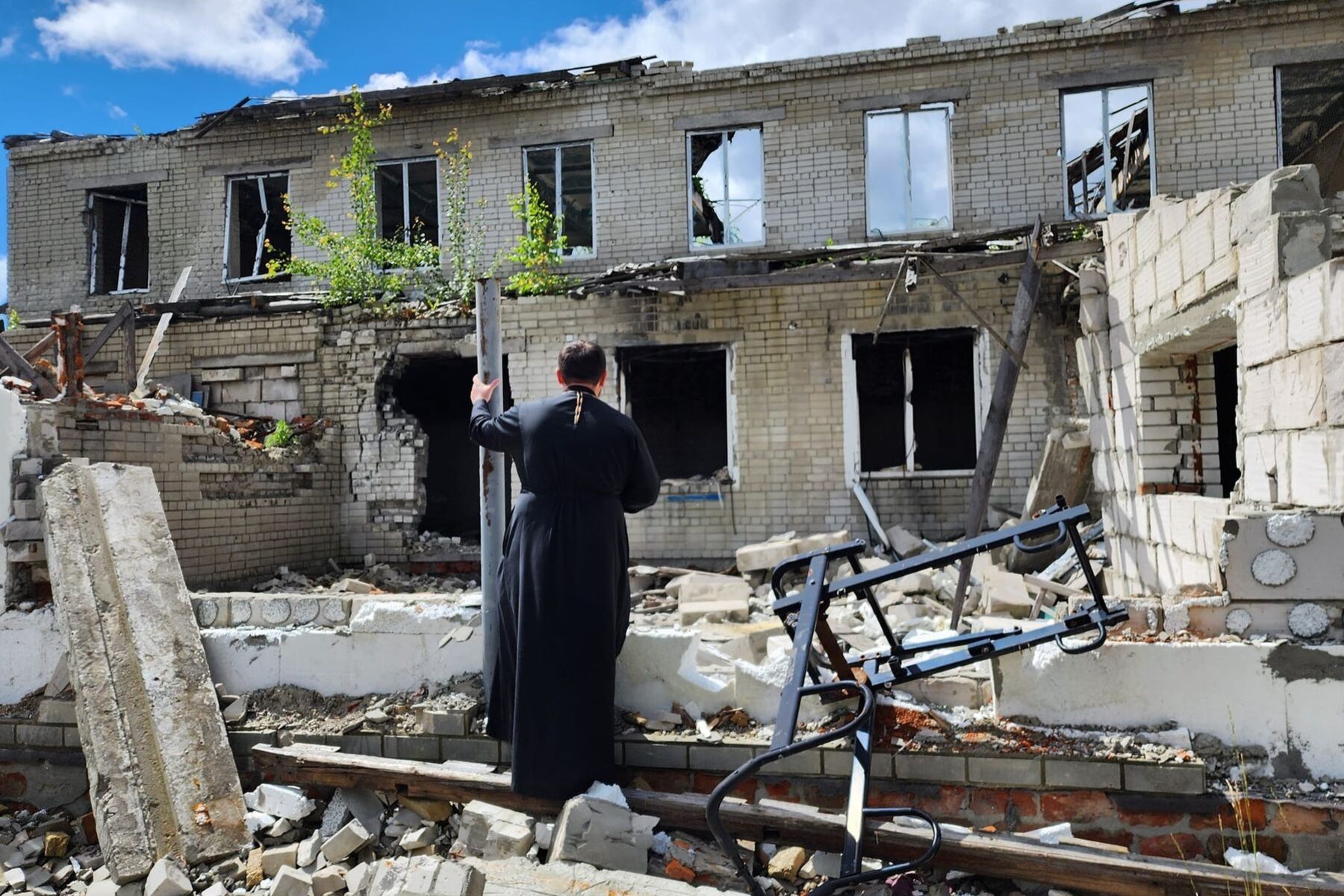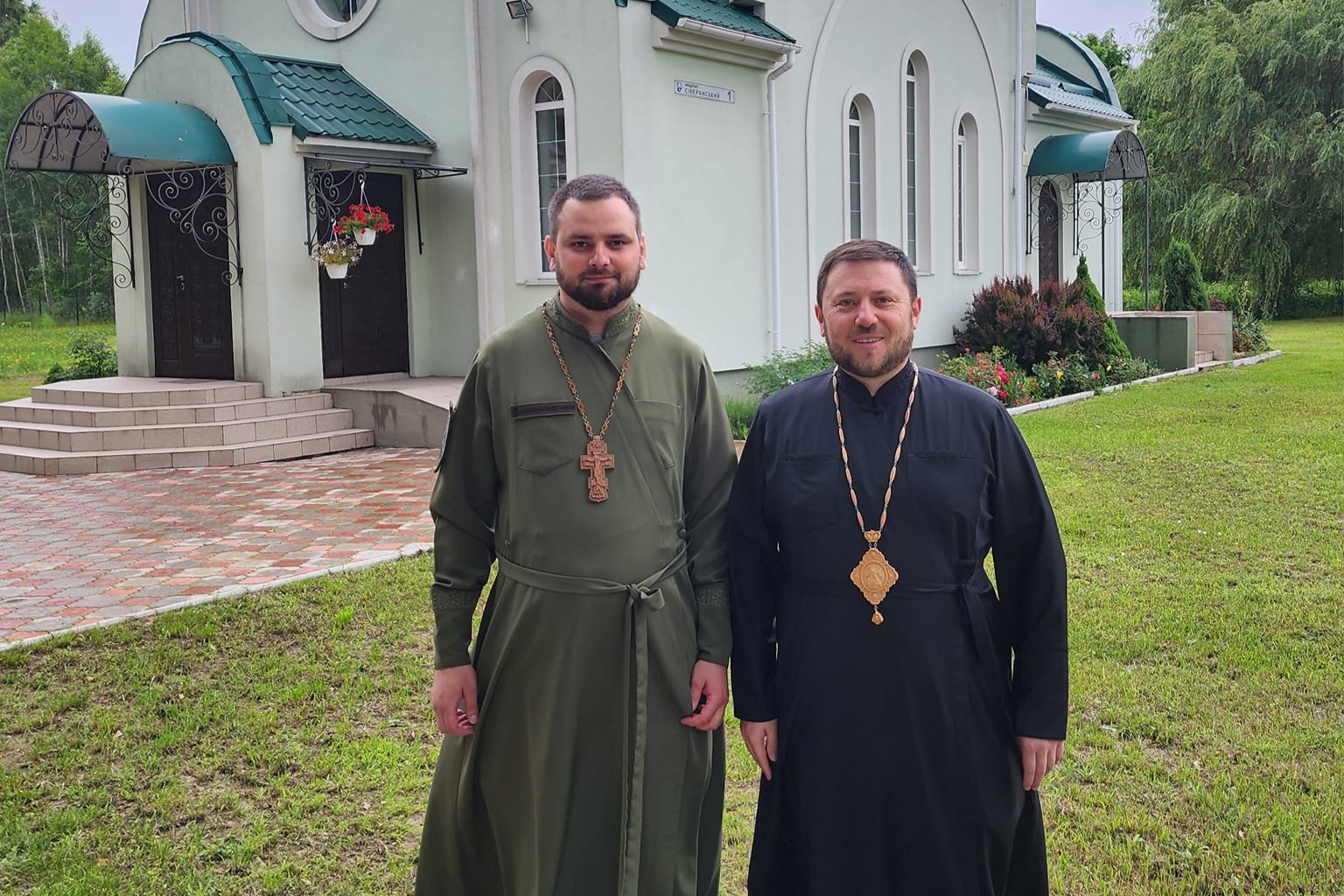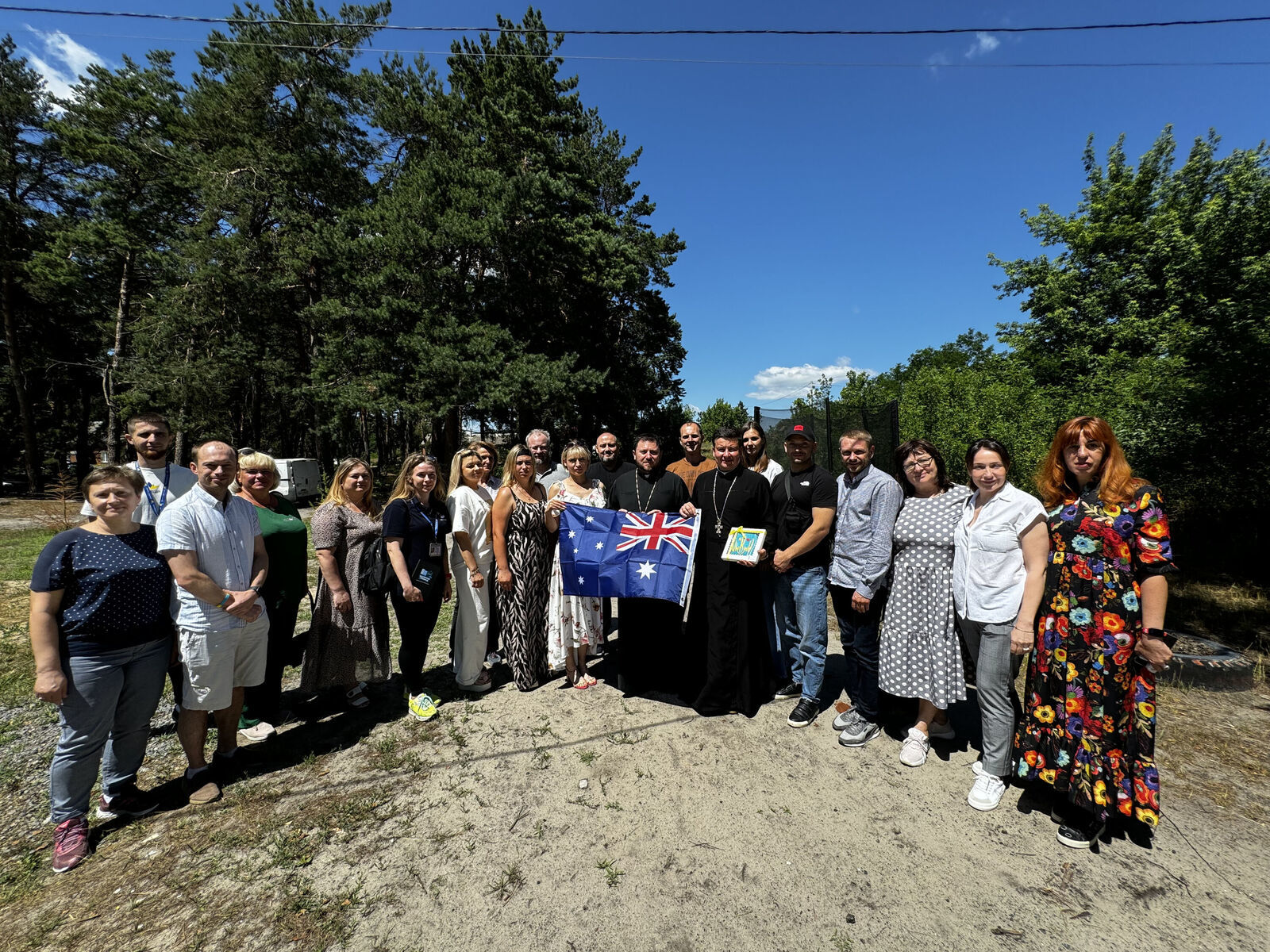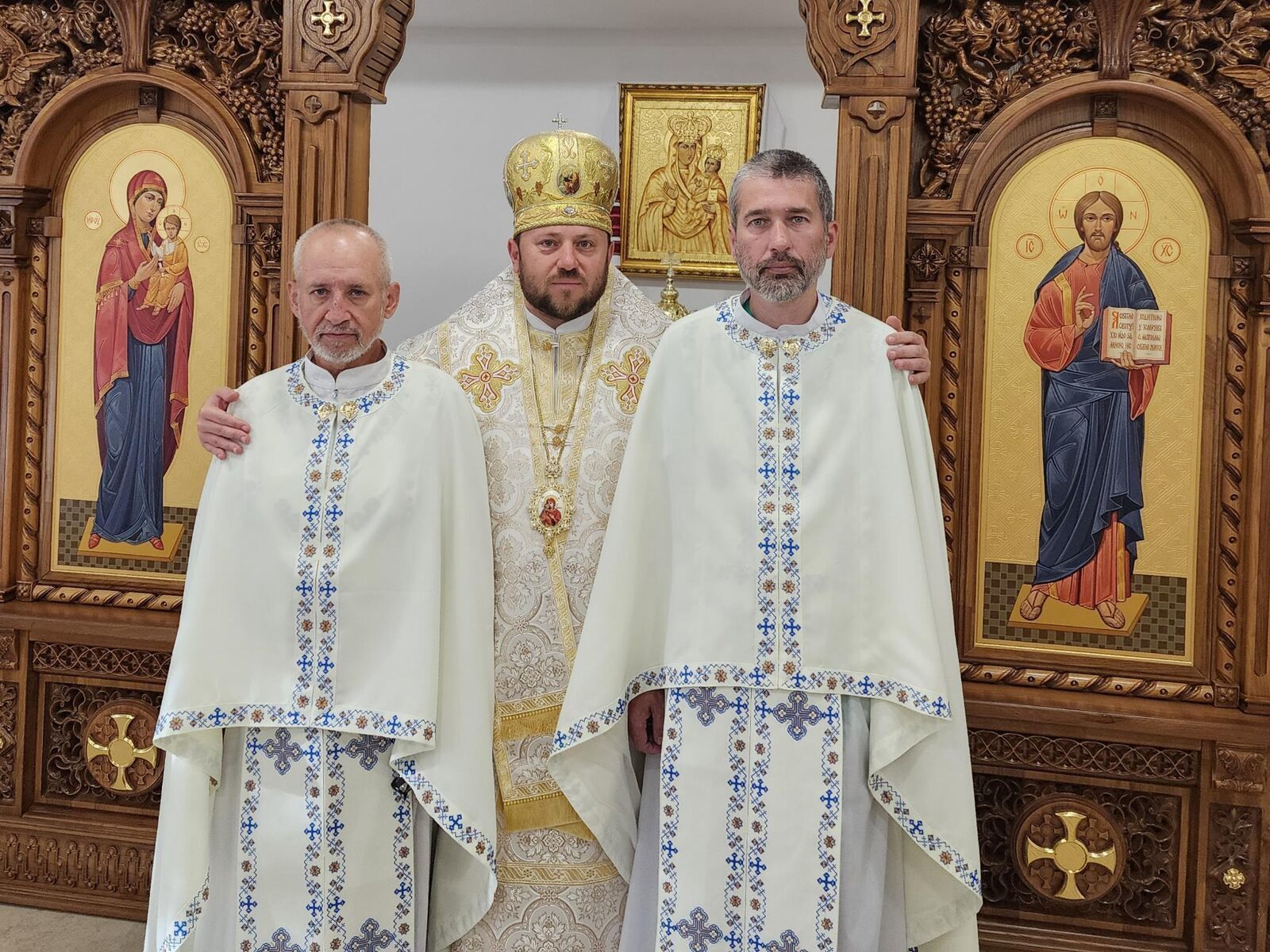“Life is a great value for which we should be grateful to God”, Bishop Mykola Bychok
July 31, 2024
For more than a month now, Mgr. Mykola Bychok, Bishop of the Eparchy of the Holy Apostles Peter and Paul in Melbourne, has been on a visit to Ukraine. The main purpose of this visit was to participate in the Synod of Bishops of the UGCC, which took place in early July at the Marian Spiritual Centre in Zarvanytsia.

However, in addition to participating in the Synod, Bishop Mykola also visited the cities and people who were among the first to suffer from the Russian invaders. In this brief conversation, the bishop shared with the press service of the Melbourne Eparchy the details of his trip, as well as his impressions and reflections on it.
Your Excellency, this is your first visit to Ukraine since the full-scale invasion, and following your social media, we know that it is quite eventful. Could you please tell us about it?
Yes, this is my first visit to Ukraine since the start of the full-scale war and since I moved to Australia. Indeed, during my stay, I was able to participate in many important events for our Church, such as the Synod of Bishops of the UGCC and the All-Ukrainian pilgrimage in Zarvanytsia, the episcopal ordination of Bishop Theodore Matsapula; to meet with our faithful at church celebrations. However, it was also very important for me to visit and support the people who perhaps suffered the most from this war and are still suffering from it. Therefore, at the end of June, together with the Patriarchal Econome, Father Lyubomyr Yavorskyy, who is responsible for the activities of the Patriarchal Foundation “Mudra Sprava”, we went on a small humanitarian mission.
What cities did you manage to visit?
Our journey began in Slavutych, where we spent half a day with Father Yuriy Lohaza, who is a military chaplain, a full-time military priest of the National Guard of Ukraine, and the pastor of the Church of Our Lady of Perpetual Help in Slavutych.
After the start of the full-scale invasion, Father Yuriy, despite the danger, did not leave the city and his faithful, and throughout this time he and his family stayed in Slavutych. Moreover, as long as he had the opportunity, he visited his military wards in the military unit and attended pro-Ukrainian rallies with his faithful. At that time, Father Yuriy’s wife was expecting their third child, and this child, a son named Yuriy, was born during the occupation, when there was no electricity in the city, in conditions of extreme danger.
Slavutych is located 200 kilometers to the north of Kyiv, near the border with Belarus. Slavutych was built specifically for the staff of the Chornobyl Nuclear Power Plant immediately after the accident, and most of its population is still connected to the nuclear industry. On 18 March 2022, Slavutych was surrounded by Russian troops, on 26 March the city was occupied, and on 27 March Russian troops left the city.
After Slavutych, we travelled to Chernihiv, where we visited the Redemptorist Sisters and their Church of the Nativity of the Blessed Virgin Mary. We also visited the places where the most intense fighting was taking place, in residential areas destroyed by rockets. We even met one man who lived in a house destroyed by rockets. He had come specially from Vinnytsia, where he now lives, to see his former home, but he still can’t even enter it because it is sealed. For me, it was a visual witness to all these terrible events. It’s really very impressive: destroyed residential buildings, pharmacies, shops, burned cars.
We also visited the outskirts of Chernihiv, where our Redemptorist Fathers built a church. This is a vivid example of how through works of mercy we can show people the loving God. At the beginning of the full-scale invasion, when people no longer had electricity, water, gas, our fathers serving in Chernihiv tried their best to serve people, even with the simplest things like bringing water or other vital things. And thanks to this help, people began to turn to the church and to God and began to build their own church.

One of the local Ukrainian groups wrote about your visit to Slavutych, particularly, thanking you for bringing humanitarian aid to the town’s residents. Please tell us about it.
The news from Ukraine has reached Australia… Yes, we brought food packages from the Melbourne Eparchy (packed as part of the initiative of the Patriarchal Foundation “Mudra Sprava”) to Slavutych, Chernihiv and Kharkiv. In this way, we wanted from our eparchy to lend a helping hand to the people in need. Our churches in Australia have donation boxes for the Patriarchal Foundation “Mudra Sprava”, and thanks to this, every Australian faithful can contribute to this assistance and support people in Ukraine.
You mentioned Kharkiv, the city is constantly under fire. What prompted you to go there despite the danger?
I wanted to experience for myself what people feel every day. For example, on my first day in Kharkiv, we heard a lot of explosions. These deafening sounds accompanied us throughout the day: during the Liturgy in the church, on the street. The sounds of explosions alternated with sirens.
My visit to Kharkiv began with the Divine Liturgy and Prayer to the Sacred Heart of Christ in the Church of St Nicholas the Wonderworker. Today this church has become an oasis of help and salvation for those poor people who have lost everything. Worship services are now held in the basement, and the entire upper church is filled with various humanitarian aid: medicines, clothes, and food packages. And so, when we left the church after the prayer, there were already a lot of people waiting at the gate to help. And we also, again within the framework of the initiative of the Patriarchal Foundation “Mudra Sprava”, brought food packages from the Melbourne Eparchy and distributed them to people.
I spoke to people from Vovchansk. They share impressive testimonies of their experiences. People saw with their own eyes how the metal was melting, and the ground was actually burning. These people say that they have lost everything, they have nowhere to live. And they want to return to their land. So, despite the danger, I wanted to be present there, to feel it, but also to show them that that faraway world, Australia, New Zealand, Oceania, they are not somewhere far away. They are with our people. As a sign of support, I presented Bishop Vasyl Tuchapets with an Australian flag, which was hung on the church of St Nicholas the Wonderworker in Kharkiv.
What impressed you the most and made you think about it?
The fact that all the people who live there, they live in danger. And they don’t know where the next “Shahed”, the next missile or guided aerial bomb might come from. Yesterday you were here, you heard explosions, but they were far away, and today a GAB flew to where you were yesterday and destroyed the place where you were standing. A vivid example: one day we were walking around Northern Saltivka, looking at all the consequences of Russia’s previous shelling, and the next day another shelling, and this destruction has become a reality again.
When we were near the opera house in Kharkiv, we saw many secondary school graduates gathered there to celebrate the end of their studies. They were all dressed up, even though it was a very dangerous time. But what struck me most was that life goes on. Even though this is a real war. But life goes on, and people are living the life of the moment.
“Life goes on, despite the fact that this is a real war”
We travelled even further than Kharkiv, to the village of Tsyrkuny, which is located 15 km from Kharkiv. At the beginning of the full-scale invasion, the village was under occupation and was almost completely destroyed. Now our Church, represented by the Patriarchal Foundation “Mudra Sprava”, is working, among other things, to heal communities, and as part of this initiative, a formative meeting was held in Tsyrkuny. That is why Father Lyubomyr Yavorskyy, and I went to Tsyrkuny.
What struck me the most was that it is already very close to the front. It’s practically another 20 kilometres away, and it’s already the frontline. You could hear the constant explosions there. But despite this, there are a lot of young people there, aged 30-35-40, who are already thinking about their present and future. They are considering various options for the development of events. Optimistic ones: how to rebuild their village, their community; and pessimistic ones: if Russian troops were approaching Kharkiv, what to do, how to help people, how to evacuate. It was something incredible: even though there is a huge danger every day, they live for today but think about tomorrow.

Another incident that really impressed me was when we drove up to the destroyed “Epicenter” construction hypermarket, where 19 people were killed in the Russian shelling in May this year, including a mother and daughter, very kind volunteers and parishioners of the Church of St Nicholas the Wonderworker, who were constantly helping.
When we approached the destroyed building, where there were a lot of children’s toys, there were children, boys and one girl, maybe ten years old. I started talking to them about what they were doing, what their preferences were, which team they supported. And I saw that life goes on. They came to this store; they saw with their own eyes what happened. But life goes on, and this is their life, as children, it is again filled with that childishness and the fact that they are children, even though they see a lot of evil, a lot of injustice, and this war touches them. This is what perhaps impressed me the most.
“It is a special experience to pray with confessors of the faith”
|
On November 16, 2022, in Berdiansk, the Russian occupation authorities arrested Redemptorist priests Fr Ivan Levytskyi and Fr Bohdan Heleta. For a long time, there was no information about the fate of the priests. On May 8, 2023, Bishop Mykola Bychok had the opportunity to address the Australian Conference of Catholic Bishops. In his speech, Bishop Mykola focused on the ministry of priests during the war and spoke about the Redemptorists, Fr Ivan Levytskyi and Fr Bohdan Heleta, who were captured by the Russian occupiers. “For almost 7 months now, the Redemptorist priests have been in Russian captivity. We still have no information about their whereabouts. Are they still alive? No one knows! All diplomats, headed by the Holy Father Pope Francis, are aware of this case. I sincerely ask you to pray for Fr Ivan Levytskyi and Fr Bohdan Heleta. Share with your faithful the living story of modern martyrs and witnesses of the faith in Ukraine”. On the morning of September 6, 2023, the bishops of the Synod of the Ukrainian Greek Catholic Church had a private audience with the Holy Father Francis in the Vatican. In a frank conversation, the hierarchs of the UGCC expressed the pain, suffering and some disappointments of the Ukrainian people. During the meeting, the hierarchs handed over to the Pope the personal belongings of the captured Redemptorist priests and an icon damaged by the war. Among the personal belongings of the captured Ukrainian priests — Fr Ivan Levytskyi and Fr Bohdan Geleta — were a missionary cross, a prayer book and a rosary, as well as photographs of the priests. |
On June 28, 2024, UGCC priests Fr Ivan Levytskyi and Fr Bohdan Heleta were released from Russian captivity. They are your fellow Redemptorists, and you have repeatedly mentioned them in your addresses to the faithful, including the Australian bishops, and prayed for their release. How did you know about this event and what were your emotions?
Indeed, I remember June 28 very well. It was about eleven pm when we received the news of the release of two of our Redemptorist priests, Father Ivan Levytskyi and Father Bohdan Heleta. These are emotions that are difficult to put into words. On the one hand, it is a great joy that the Lord heard all our prayers that we offered to Him during the year and a half of our priests” captivity. On the other hand, it is also a great concern for our other prisoners of war who are still fighting for their lives in those terrible conditions and, at the same time, through all their suffering, give evidence of boundless love for their beloved mother Ukraine.
What I want to say. Seeing the fathers for the first time, then in photographs, and seeing them later, during the All-Ukrainian pilgrimage in Zarvanytsia, where we, the Redemptorist bishops, had the opportunity to meet them, I see that their faces are completely different, they now occasionally smile. I can see that the Redemptorist community is healing them, not only the Redemptorist bishops” community, but in particular the Redemptorist community, where they have been staying for several weeks now, and they are returning to the daily routine of our lives. For me, it is a great blessing that I have already had several opportunities to pray with the fathers in the chapel of St Alphonsus Monastery in Lviv, and it is also such a special experience for me to pray with the confessors of the faith.

When Fr Bohdan Heleta, who has recently been released from captivity, addressed the audience, he thanked everyone for everything they are doing to free the captives, but also emphasised that this is still not enough and that more needs to be done. In your opinion, what can each of us individually do for this purpose and what can we do together as a Church?
What we can do and must do is to remember, testify and never forget any military captive, but also, ultimately, civilian captives who are still in terrible conditions, particularly, in the occupied territories, but also in captivity somewhere in Russia. Captivity is something difficult to describe in words. When we listen to our priests released from captivity, we see how difficult it is to heal those wounds, how difficult it is for them to get used to other realities. Even when they share with us, they still say that they do not believe they are free yet. They do not believe that they are already on the free territory of an independent Ukraine. They still have some fear to a certain extent. Sometimes they can’t even sleep well, because everything they have been through has left a negative mark on their lives.
But today they are true confessors of the faith. And, looking at them, everyone can see in their release also a ray of hope for the release of other soldiers and civilians from captivity. The biggest paradox is that it is forbidden to take civilians prisoner in war. However, the Russians, who are destroying our country, destroying our statehood, our people, are committing the greatest evil not only by capturing military personnel, but also civilians who have nothing to do with the hostilities.
So, what we all need to do is to remember about our military captives, to pray, but also to witness about them wherever we are, whether it is in Ukraine, America, Australia, or any other part of the world.
“For so long our church has been praying for the release of our priests from Berdiansk. And now they are with us! We really feel today that Christian hope will not put us to shame, because its power is the power of God”, His Beatitude Sviatoslav in Zarvanytsia, 14 July 2024.
Your Excellency, thank you for this interview, and finally, what you would like to tell your faithful in Australia after what you have seen and experienced?
I would like to remind you that life is a great treasure for which we should be grateful to God, not just every day, but every minute. Very often in Australia, this well-being, this good life, is somehow taken for granted. We have a good life and that’s it. But very often in this life we do not live according to God’s laws, we have lost some values and other spiritual things. What I saw among those people who are under fire every day are people who lived in the same way, who had everything. I was particularly impressed when I approached a nine-storey building that had been destroyed by a Russian missile, and when among all the rubble I saw some children’s clothes, some shoes, and I also saw a birthday card for a child, I saw photos of certain people sitting at a table celebrating something, and then in one second the war destroyed it all.
You walk around this neighbourhood called North Saltivka (Kharkiv), a neighbourhood where half a million people used to live, and, in fact, because of this war, there is no one there now. You walk around like in this ghost town, and you just see what Russia has done, how it has “liberated” these people. So, I want to say that for us in Australia, we need to somehow rethink our lives, that this is a gift from God, that we live, that we have everything, and we need to appreciate it and thank God first of all for the fact that we have peace in Australia, because we have forgotten that this is a great grace of God, because only when you lose something do you start to appreciate it.
Photo: Bishop Mykola BychokAccording to the press service of the Eparchy of the Holy Apostles Peter and Paul in Melbourne
Press service of the Patriarchal Foundation “Mudra Sprava”